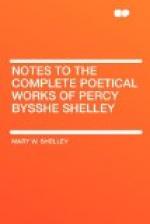“Rosalind and Helen” was finished during the summer of 1818, while we were at the Baths of Lucca.
Note by Mrs. Shelley.
From the Baths of Lucca, in 1818, Shelley visited Venice; and, circumstances rendering it eligible that we should remain a few weeks in the neighbourhood of that city, he accepted the offer of Lord Byron, who lent him the use of a villa he rented near Este; and he sent for his family from Lucca to join him.
I Capuccini was a villa built on the site of a Capuchin convent, demolished when the French suppressed religious houses; it was situated on the very overhanging brow of a low hill at the foot of a range of higher ones. The house was cheerful and pleasant; a vine-trellised walk, a pergola, as it is called in Italian, led from the hall-door to a summer-house at the end of the garden, which Shelley made his study, and in which he began the “Prometheus”; and here also, as he mentions in a letter, he wrote “Julian and Maddalo”. A slight ravine, with a road in its depth, divided the garden from the hill, on which stood the ruins of the ancient castle of Este, whose dark massive wall gave forth an echo, and from whose ruined crevices owls and bats flitted forth at night, as the crescent moon sunk behind the black and heavy battlements. We looked from the garden over the wide plain of Lombardy, bounded to the west by the far Apennines, while to the east the horizon was lost in misty distance. After the picturesque but limited view of mountain, ravine, and chestnut-wood, at the Baths of Lucca, there was something infinitely gratifying to the eye in the wide range of prospect commanded by our new abode.
Our first misfortune, of the kind from which we soon suffered even more severely, happened here. Our little girl, an infant in whose small features I fancied that I traced great resemblance to her father, showed symptoms of suffering from the heat of the climate. Teething increased her illness and danger. We were at Este, and when we became alarmed, hastened to Venice for the best advice. When we arrived at Fusina, we found that we had forgotten our passport, and the soldiers on duty attempted to prevent our crossing the laguna; but they could not resist Shelley’s impetuosity at such a moment. We had scarcely arrived at Venice before life fled from the little sufferer, and we returned to Este to weep her loss.
After a few weeks spent in this retreat, which was interspersed by visits to Venice, we proceeded southward.




